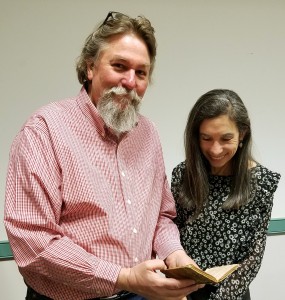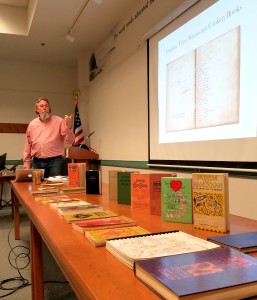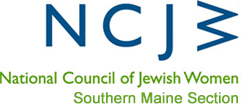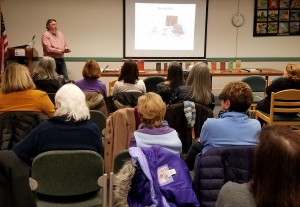Don Lindgren, proprieter of Rabelais, Fine Books on Food & Drink, in Biddeford, shared his enthusiasm for cookbooks as social and economic artifacts in a talk Thursday, March 16, at Falmouth Memorial Library. About 20 people nibbled on snacks before settling in for the free presentation sponsored by NCJW and the Library.
Board member Eydie Pry zant introduced Lindgren, who is a member of the Board of Governors of the Antiquarian Booksellers’ Association of America and a member of the International League of Antiquarian Booksellers. As such, he looks at cookbooks as more than a source of recipe ideas for dinner.
zant introduced Lindgren, who is a member of the Board of Governors of the Antiquarian Booksellers’ Association of America and a member of the International League of Antiquarian Booksellers. As such, he looks at cookbooks as more than a source of recipe ideas for dinner.
During his talk, he frequently referred to a number of rare volumes which he brought with him. He showed how the binding of a book could indicate its humble origin and intent; the earliest slender volumes were bound in leather because hides were cheap and widely available.
He introduced the audience to a new way of  looking at the list of ingredients in a recipe. By mapping the ingredients called for in an entire cookbook, (peas from the garden, milk from cows in the barn, venison from the forest) it is possible to gauge the economic status of the intended readership. So royal cookbooks assumed access to rare, imported spices and many labor-intensive ingredients.
looking at the list of ingredients in a recipe. By mapping the ingredients called for in an entire cookbook, (peas from the garden, milk from cows in the barn, venison from the forest) it is possible to gauge the economic status of the intended readership. So royal cookbooks assumed access to rare, imported spices and many labor-intensive ingredients.
Don shared a number of early Jewish cookbooks which, though aimed at Jewish cooks, were not strictly kosher. One could trace the diaspora in volumes like the delightfully titled, “A Russian Jew Cooks in Peru.”
Thanks, Eydie, for organizing, such a fun and engaging event.


